'People will forgive you for being wrong, but they will never forgive you for being right - especially if events prove you right while proving them wrong.' Thomas Sowell
Search This Blog
Showing posts with label dignity. Show all posts
Showing posts with label dignity. Show all posts
Thursday, 11 April 2024
Wednesday, 30 October 2019
If we’re serious about changing the world, we need a better kind of economics to do it
The pursuit of rapid growth won’t solve the huge challenges we face. A more honest, humane approach is the answer write Esther Duflo and Abhijit Banerjee (joint winners of the 2019 Nobel prize in economics) in The Guardian


‘How can society help all those people whom the markets leave behind?’ A child wait for a plate of food at a soup kitchen in Salta province, Argentina. Photograph: Javier Corbalan/AP
For that to happen, we need to understand what undermines trust in economists. Part of the problem is that there is plenty of bad economics around. The self-proclaimed economists on TV and in the press – chief economist of Bank X or Firm Y – are, with important exceptions, primarily spokespeople for their firms’ economic interests, who often feel free to ignore the weight of the evidence. Moreover, they have a relatively predictable slant towards market optimism at all costs, which is what the public associates with economists in general. It does not help that there is a class of economists who make predictions about broad trends in the economy, which often turn out to be wrong.
Another part of the problem is that, especially in the UK and the US, a lot of the economics that has filtered into government thinking is the most beholden to orthodoxy, and the least able to pay attention to any fact that does not square with it. Economists are therefore naturally seen as those who keep repeating that regulations, taxes, and public spending all need to be slashed to let the market be, and that eventually everything will all “trickle down” to the poor, even as we watch inequality exploding.
But good economics is much less strident, and quite different. It is less like the hard sciences and more like engineering or plumbing: it breaks big problems into manageable chunks and tries to solve them with a pragmatic approach – a combination of intuition and theory, trial and acknowledged errors. Good economics starts with some facts that are troubling, makes some guesses based on what we already know about human behaviour and theories that have been shown to work, uses data to test those guesses, refines (or radically alters) its line of attack based on the new set of facts and, eventually, with some luck, gets to a solution.
We have spent our careers studying the poor, trying to apply this kind of experimental approach to the problems they face. Instead of relying on our intuition, or that of others, we set up large-scale, rigorous randomised controlled trials to understand what works, what does not work, and why. We are not alone: this movement has taken hold in economics. The Abdul Latif Jameel Poverty Action Lab (J-PAL), the network we co-founded in 2013, has 400 affiliated or invited researchers, and together they have finished or are working on nearly a thousand projects on topics as different as the impact of sleep on productivity and happiness, and the role of incentives for tax collectors.

‘Economists have a tendency to adopt a notion of wellbeing that is often too narrow – some version of income or material consumption.’ A homeless man outside Victoria Station in London. Photograph: Victoria Jones/PA
This work is starting to make a difference. To date, 400 million people have been touched by policies that J-PAL affiliates have shown to be effective. Just as importantly, although no single project offers a definitive answer, together they allow us to understand much better some of the mechanisms behind the persistence of poverty. While our own beat has mostly been the poor countries, there are many others doing good economics in countries like the US, which can help shed light on the big issues our societies are grappling with.
Economists have a tendency to adopt a notion of wellbeing that is often too narrow – some version of income or material consumption. Yet we know in our guts that a fulfilling life needs much more than that: the respect of the community, the comforts of family and friends, dignity, lightness, pleasure. The focus on income alone is not just a convenient shortcut – it is a distorting lens that has often led the smartest economists down the wrong path, and policymakers to the wrong decisions. This is a big part of what persuades so many of us that the whole world is waiting at the door to steal our well-paying jobs. It is what has led to a single-minded focus on restoring the western nations to some glorious past of rapid economic growth. It is also what makes the trade-off between the growth of the economy and the survival of the planet seem so stark.
A better conversation must start by acknowledging the deep human desire for dignity and human contact – and treating it not as a distraction but as a better way to understand each other, and to set ourselves free from what may appear to be unresolvable contradictions.
Restoring human dignity to its central place has the potential to set off a profound rethinking of economic priorities and the ways in which societies care for their members, particularly when they are in need. At the very least, this should help persuade some of the disaffected that economics is about them as well, and that we economists have useful contributions to make to the rebuilding that must happen.

Rubbish pickers at the municipal site in Maputo, Mozambique. Photograph: Gianluigi Guercia/AFP/Getty Images
In 2017, a poll in the UK asked: “Whose opinion do you trust the most when they talk about their field of expertise?” Nurses came first – 84% trust them. Politicians came last. Economists were second from bottom on 25%.This trust deficit is mirrored by the fact that the consensus of economists (when it exists) is often systematically different from the views of ordinary citizens. The Booth School of Business at the University of Chicago regularly asks a group of about 40 prominent academic economists their views on core economic topics. Working with the economist Stefanie Stantcheva, we ran a survey: we selected 10 of the questions that were asked of the Booth panel and put them to 10,000 Americans.
On most of these issues, our respondents were sharply at odds with economists. For example, every single member of the Booth panel disagreed with the proposition that “imposing new US tariffs on steel and aluminium will improve Americans’ wellbeing”. Only a third of our respondents shared their view. And the gap is not only because people are not informed of what economists think: telling them does not seem to change their opinion one bit.
Economists are often too wrapped up in models and methods, and sometimes forget where science ends and ideology begins
This is troubling, because questions of economics and economic policy are central to the present crisis. Is migration actually threatening the livelihoods of poor workers? Has international trade worsened inequality? Should we worry about the rise of artificial intelligence or celebrate it? Why are our societies becoming increasingly unequal, and what can we (or should we) do about it? How can society help all those people whom the markets leave behind?
Economists have a lot to say about these big issues: they study immigration to see what it does to wages, taxation to determine if it discourages enterprise, redistribution through social programmes to figure out whether it encourages sloth. They have long worried about what happens when nations trade. They have worked hard to understand why some countries grow and others don’t, and what, if anything, governments can do to help. They gather data on what makes people generous or wary, what makes a man leave home and migrate to a strange place, how social media plays on our prejudices. The most recent research often has surprising things to say about all these issues – especially to those used to the pat answers coming from old high school textbooks and TV “economists”.
It’s not that when economists and the public have different views the economists are always right. We, the economists, are often too wrapped up in our models and methods and sometimes forget where science ends and ideology begins. But good economics can be a source of hope – a way to understand what went wrong but also to explain how our world can be put back together, as long as we are honest in our diagnosis of the problems.
In 2017, a poll in the UK asked: “Whose opinion do you trust the most when they talk about their field of expertise?” Nurses came first – 84% trust them. Politicians came last. Economists were second from bottom on 25%.This trust deficit is mirrored by the fact that the consensus of economists (when it exists) is often systematically different from the views of ordinary citizens. The Booth School of Business at the University of Chicago regularly asks a group of about 40 prominent academic economists their views on core economic topics. Working with the economist Stefanie Stantcheva, we ran a survey: we selected 10 of the questions that were asked of the Booth panel and put them to 10,000 Americans.
On most of these issues, our respondents were sharply at odds with economists. For example, every single member of the Booth panel disagreed with the proposition that “imposing new US tariffs on steel and aluminium will improve Americans’ wellbeing”. Only a third of our respondents shared their view. And the gap is not only because people are not informed of what economists think: telling them does not seem to change their opinion one bit.
Economists are often too wrapped up in models and methods, and sometimes forget where science ends and ideology begins
This is troubling, because questions of economics and economic policy are central to the present crisis. Is migration actually threatening the livelihoods of poor workers? Has international trade worsened inequality? Should we worry about the rise of artificial intelligence or celebrate it? Why are our societies becoming increasingly unequal, and what can we (or should we) do about it? How can society help all those people whom the markets leave behind?
Economists have a lot to say about these big issues: they study immigration to see what it does to wages, taxation to determine if it discourages enterprise, redistribution through social programmes to figure out whether it encourages sloth. They have long worried about what happens when nations trade. They have worked hard to understand why some countries grow and others don’t, and what, if anything, governments can do to help. They gather data on what makes people generous or wary, what makes a man leave home and migrate to a strange place, how social media plays on our prejudices. The most recent research often has surprising things to say about all these issues – especially to those used to the pat answers coming from old high school textbooks and TV “economists”.
It’s not that when economists and the public have different views the economists are always right. We, the economists, are often too wrapped up in our models and methods and sometimes forget where science ends and ideology begins. But good economics can be a source of hope – a way to understand what went wrong but also to explain how our world can be put back together, as long as we are honest in our diagnosis of the problems.

‘How can society help all those people whom the markets leave behind?’ A child wait for a plate of food at a soup kitchen in Salta province, Argentina. Photograph: Javier Corbalan/AP
For that to happen, we need to understand what undermines trust in economists. Part of the problem is that there is plenty of bad economics around. The self-proclaimed economists on TV and in the press – chief economist of Bank X or Firm Y – are, with important exceptions, primarily spokespeople for their firms’ economic interests, who often feel free to ignore the weight of the evidence. Moreover, they have a relatively predictable slant towards market optimism at all costs, which is what the public associates with economists in general. It does not help that there is a class of economists who make predictions about broad trends in the economy, which often turn out to be wrong.
Another part of the problem is that, especially in the UK and the US, a lot of the economics that has filtered into government thinking is the most beholden to orthodoxy, and the least able to pay attention to any fact that does not square with it. Economists are therefore naturally seen as those who keep repeating that regulations, taxes, and public spending all need to be slashed to let the market be, and that eventually everything will all “trickle down” to the poor, even as we watch inequality exploding.
But good economics is much less strident, and quite different. It is less like the hard sciences and more like engineering or plumbing: it breaks big problems into manageable chunks and tries to solve them with a pragmatic approach – a combination of intuition and theory, trial and acknowledged errors. Good economics starts with some facts that are troubling, makes some guesses based on what we already know about human behaviour and theories that have been shown to work, uses data to test those guesses, refines (or radically alters) its line of attack based on the new set of facts and, eventually, with some luck, gets to a solution.
We have spent our careers studying the poor, trying to apply this kind of experimental approach to the problems they face. Instead of relying on our intuition, or that of others, we set up large-scale, rigorous randomised controlled trials to understand what works, what does not work, and why. We are not alone: this movement has taken hold in economics. The Abdul Latif Jameel Poverty Action Lab (J-PAL), the network we co-founded in 2013, has 400 affiliated or invited researchers, and together they have finished or are working on nearly a thousand projects on topics as different as the impact of sleep on productivity and happiness, and the role of incentives for tax collectors.

‘Economists have a tendency to adopt a notion of wellbeing that is often too narrow – some version of income or material consumption.’ A homeless man outside Victoria Station in London. Photograph: Victoria Jones/PA
This work is starting to make a difference. To date, 400 million people have been touched by policies that J-PAL affiliates have shown to be effective. Just as importantly, although no single project offers a definitive answer, together they allow us to understand much better some of the mechanisms behind the persistence of poverty. While our own beat has mostly been the poor countries, there are many others doing good economics in countries like the US, which can help shed light on the big issues our societies are grappling with.
Economists have a tendency to adopt a notion of wellbeing that is often too narrow – some version of income or material consumption. Yet we know in our guts that a fulfilling life needs much more than that: the respect of the community, the comforts of family and friends, dignity, lightness, pleasure. The focus on income alone is not just a convenient shortcut – it is a distorting lens that has often led the smartest economists down the wrong path, and policymakers to the wrong decisions. This is a big part of what persuades so many of us that the whole world is waiting at the door to steal our well-paying jobs. It is what has led to a single-minded focus on restoring the western nations to some glorious past of rapid economic growth. It is also what makes the trade-off between the growth of the economy and the survival of the planet seem so stark.
A better conversation must start by acknowledging the deep human desire for dignity and human contact – and treating it not as a distraction but as a better way to understand each other, and to set ourselves free from what may appear to be unresolvable contradictions.
Restoring human dignity to its central place has the potential to set off a profound rethinking of economic priorities and the ways in which societies care for their members, particularly when they are in need. At the very least, this should help persuade some of the disaffected that economics is about them as well, and that we economists have useful contributions to make to the rebuilding that must happen.
Sunday, 13 March 2016
Are we ready to confront death without religion?
A rise in atheist funerals shows that fewer of us need to rely on faith when confronted with mortality
Adam Lee in The Guardian
For centuries, the Christian church wrote the script for how westerners deal with death. There was the deathbed confession, the last rites, the pallbearers, the obligatory altar call, the burial ceremony, the stone, the angels-and-harps imagery. Yet that archaic and stereotypical vision of death, like a mossy and weather-worn statue, is crumbling – and in its place, something new and better has a chance to grow.
Traditional funerals and burials are declining in popularity (to the point where churches are bemoaning the trend), in favor of alternatives like green burial and cremation. Personalized humanist funerals and secular celebrants are becoming more common, echoing a trend that’s also occurring with weddings.
As younger generations turn away from religion, the US is slowly but surely becoming more secular. As mortician and “good death” advocate Caitlin Doughty writes in her book, Smoke Gets In Your Eyes & Other Lessons from the Crematory, America is seeing a sea-change in traditions and rituals surrounding mortality.
Doughty and others see this shift not as something to be lamented, but to be embraced. Instead of following a script that’s been written for us, we can create our own customs and choose for ourselves how we want to be remembered. We can design funerals that emphasize the good we did, the moments that made our lives meaningful and the lessons we’d like to pass on.
Rather than the same handful of biblical passages, we can have readings from any book, poem or song in the whole broad tapestry of human culture. Rather than mourning, gloom and sermons on sin, we can have ceremonies that are joyful celebrations of the deceased person’s life.
But the rise of humanism isn’t just influencing what funerals look like; it’s changing how we die. For ages, when the church’s word was law, suicide was deemed a mortal sin. Even today, studies find that more fervent religious devotion correlates to more desire for aggressive and medically futile end-of-life intervention, not less.
The most famous case in recent years was Brittany Maynard, a 29-year-old woman with terminal brain cancer who ended her life in 2014 under Oregon’s death-with-dignity law. Maynard’s story put a sympathetic public face on the right-to-die movement, which proved decisive when California Governor Jerry Brown, a former Jesuit seminarian, signed a similar bill the next year despite heavy pressure from religious groups. He, too, cited the value of autonomy and freedom from suffering:
“In the end, I was left to reflect on what I would want in the face of my own death,” Brown wrote in a signing message. “I do not know what I would do if I were dying in prolonged and excruciating pain” he added.
In California and elsewhere, the staunchest adversaries of the right to die are churches and religious believers who assert that the time, place and manner of each person’s death is chosen by God, and that we have no right to change that regardless of the human cost.
And yet, almost without notice, that’s become a minority position. Gallup polls now find that as many as 70% of Americans now support a right to aid in dying. This position entails that, when people are suffering without hope of recovery, they should be allowed to end their lives painlessly, with medical help, at a time of their choosing.
This, too, is a deeply humanist conception of death. It springs from the idea that needless suffering is the greatest evil there is and that autonomy is the supreme value. If we’re the ultimate owners of our own lives, then we have the right to lay them down when we judge they’ve become unbearable.
Even as religious trappings linger in our rituals and attitudes around death, society is coming to adopt the humanist viewpoint on mortality, neither fearing nor denying it, but gracefully accepting it as an inevitable part of the human experience. The sooner we bury our religious past, the better.
Adam Lee in The Guardian
For centuries, the Christian church wrote the script for how westerners deal with death. There was the deathbed confession, the last rites, the pallbearers, the obligatory altar call, the burial ceremony, the stone, the angels-and-harps imagery. Yet that archaic and stereotypical vision of death, like a mossy and weather-worn statue, is crumbling – and in its place, something new and better has a chance to grow.
Traditional funerals and burials are declining in popularity (to the point where churches are bemoaning the trend), in favor of alternatives like green burial and cremation. Personalized humanist funerals and secular celebrants are becoming more common, echoing a trend that’s also occurring with weddings.
As younger generations turn away from religion, the US is slowly but surely becoming more secular. As mortician and “good death” advocate Caitlin Doughty writes in her book, Smoke Gets In Your Eyes & Other Lessons from the Crematory, America is seeing a sea-change in traditions and rituals surrounding mortality.
Doughty and others see this shift not as something to be lamented, but to be embraced. Instead of following a script that’s been written for us, we can create our own customs and choose for ourselves how we want to be remembered. We can design funerals that emphasize the good we did, the moments that made our lives meaningful and the lessons we’d like to pass on.
Rather than the same handful of biblical passages, we can have readings from any book, poem or song in the whole broad tapestry of human culture. Rather than mourning, gloom and sermons on sin, we can have ceremonies that are joyful celebrations of the deceased person’s life.
But the rise of humanism isn’t just influencing what funerals look like; it’s changing how we die. For ages, when the church’s word was law, suicide was deemed a mortal sin. Even today, studies find that more fervent religious devotion correlates to more desire for aggressive and medically futile end-of-life intervention, not less.
The most famous case in recent years was Brittany Maynard, a 29-year-old woman with terminal brain cancer who ended her life in 2014 under Oregon’s death-with-dignity law. Maynard’s story put a sympathetic public face on the right-to-die movement, which proved decisive when California Governor Jerry Brown, a former Jesuit seminarian, signed a similar bill the next year despite heavy pressure from religious groups. He, too, cited the value of autonomy and freedom from suffering:
“In the end, I was left to reflect on what I would want in the face of my own death,” Brown wrote in a signing message. “I do not know what I would do if I were dying in prolonged and excruciating pain” he added.
In California and elsewhere, the staunchest adversaries of the right to die are churches and religious believers who assert that the time, place and manner of each person’s death is chosen by God, and that we have no right to change that regardless of the human cost.
And yet, almost without notice, that’s become a minority position. Gallup polls now find that as many as 70% of Americans now support a right to aid in dying. This position entails that, when people are suffering without hope of recovery, they should be allowed to end their lives painlessly, with medical help, at a time of their choosing.
This, too, is a deeply humanist conception of death. It springs from the idea that needless suffering is the greatest evil there is and that autonomy is the supreme value. If we’re the ultimate owners of our own lives, then we have the right to lay them down when we judge they’ve become unbearable.
Even as religious trappings linger in our rituals and attitudes around death, society is coming to adopt the humanist viewpoint on mortality, neither fearing nor denying it, but gracefully accepting it as an inevitable part of the human experience. The sooner we bury our religious past, the better.
Sunday, 6 April 2014
Margaret Thatcher began Britain's obsession with property. It's time to end it
Right to buy helped to turn the UK into a nation that saw houses as something to make money from, not to live in. Now we are at crisis point – and the government must step in
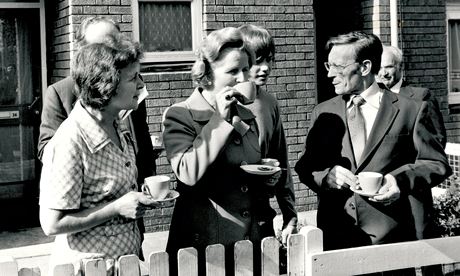
Margaret Thatcher takes tea with former GLC council house tenants in Balham in 1978. Photograph: Kenneth Saunders for the Guardian
In 1975, in her first speech as leader to the Conservative party conference, Margaret Thatcher declared her belief in a "property-owning democracy". She didn't invent the phrase – the 1920s Tory MP Noel Skelton should take the credit for that, and the American liberal philosopher John Rawls picked it up before she did – but it became the most distinctive of all her many distinctive ideas, the one that most succinctly describes the Britain she wanted to create.
Through thrift and hard work, went the theory, ordinary families should be able to buy their own homes. It would give them security, dignity and freedom and liberate them from the nannying of local council landlords. It would make them better citizens, with their own stake in the economic wellbeing of the country, they would have an incentive to contribute to national prosperity. It exemplified her belief that capitalism was good not only for the rich, but for people on modest incomes. As the then environment secretary, Michael Heseltine, put it later: "Home ownership stimulates the attitudes of independence and self-reliance that are the bedrock of a free society."
So Thatcher allowed council tenants to buy their own homes at reduced prices, and sincethe right to buy was introduced, about 1.5m have been bought. She presided over an economy in which house buying became a national obsession and home ownership went up from 9.7m to 12.8m. Fundamental to her idea was that government, which had built between a third and a half of all homes for the previous three decades, should step back. Councils could no longer build council housing. The market would provide. Houses would be built by housebuilders, to use the standard term for the companies that buy land, win planning permission and then (sometimes) put homes on it.
Thatcher's idea is now at a point of crisis. Housebuilders are not building enough houses, and the proportion of people owning their own homes has been falling since 2007. People have long ago found that it does not always make you free to be shackled to a mortgage, still less if you cannot cross the increasingly high threshold into ownership. In London and the south-east, businesses lament the effects on them of expensive housing caused by the lack of mobility of potential workers.
Debt and speculation have been encouraged more than thrift and people who only wanted a home were forced to be gamblers in a turbulent market. The property-owning democracy is not turning out to be democratic, excluding as it does the large minority who don't own homes. In a sick practical joke, people have been encouraged to take on long-term mortgages at the same time that secure lifetime employment, which might pay for them, is disappearing. As for public spirit, with rising house prices goes rising nimbyism, as owners seek to protect their investment from all possible threats, above all the threat of more homes being built nearby that other people might live in.
Over three decades, a culture has been created in which the price of homes colours almost every aspect of life. It affects people's decisions about whether and when to live together, stay together and have children. An economy has been created in which inflation, otherwise frowned upon, is desirable in house prices, even essential. Property values are used as the principal tool of urban regeneration and, when those values fail to materialise, so does the regeneration. The infamous bedroom tax regards a few square metres of spare space as such a great asset that it must be wrenched from the grasp of the undeserving poor. "Values", indeed, is a telling word – we use it more to describe property than anything to do with ethical or social ideals.
It is amazing, beyond satire, that the two biggest stories in housing are on the one hand the bedroom tax and on the other the streets and squares of empty houses in Belgravia and Kensington, bought as investments by owners who rarely visit. At the same time that, when it comes to poor people, vacant rooms are deemed an offence to be expunged, they grow unchecked in the most desirable parts of London.
At almost every level, the market isn't working, from ex-industrial towns in northern England, where the values are too low to justify repairs to existing houses, to the under-supply and high prices in London, where an average home now costs £458,000, or 13 times the median full-time income. Hidden favelas are growing up in suburbs such as Newham and Southall, with unauthorised developments in back gardens and flats occupied at many times the levels for which they were designed.
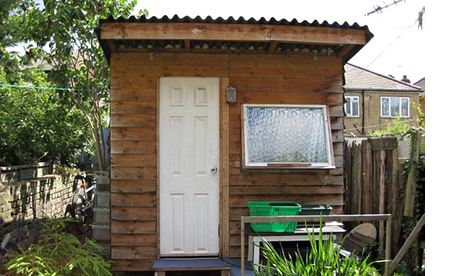 Newham, London: favela-style housing is on the increase in suburbs such as Newham and Southall, with severe overcrowding and unauthorised developments in back gardens and yards. Photograph: Newham Council/Archant
Newham, London: favela-style housing is on the increase in suburbs such as Newham and Southall, with severe overcrowding and unauthorised developments in back gardens and yards. Photograph: Newham Council/Archant
A system has been created with a few winners, for sure, but not the people excluded from the market, nor those barely able to pay for their homes, some of whom will drown when interest rates start going up. Even those who bought early enough to have a profit on their home find it to be largely nominal, impossible to realise without removing themselves or their children from the all-important property ladder.
Not even housebuilders are entirely happy, although recent government policies such as Help to Buy and the encouragement of easy credit have helped their share prices rise. They grumble that planning restrictions and regulations make their work unreasonably difficult and that the margins in their business are low. "It is a fantastically hard business," says one of those involved, because of its booms and busts. The most obvious winners were people such as Judith and Fergus Wilson, the Kent-based buy-to-let magnates said to be worth £180m. But here too there are losers – the people who got their fingers burned when this particular market crashed.
As Danny Dorling, in his recent book All That is Solid: The Great Housing Disaster has pointed out, the home is now seen as a commodity, as a unit of investment to be traded up or down. Attachment to a place, or the interconnectedness of units to make a community, is given little value. The pursuit of ideals, the idea of social or architectural betterment in the provision of housing, has all but disappeared.
Early in the last century, when Arts and Crafts architecture was flourishing and the first garden cities were being planned, the German architect Hermann Muthesius publishedThe English House, which was based on the premise that this country was particularly good at domestic architecture and that countries such as Germany should look and learn. It is unlikely anyone would want to do this now, as new British homes have, as well as the highest prices, the meanest dimensions to be found anywhere in Europe. What we have instead are a series of distinctive if largely inadvertent types, created by a warped market, which might be summarised thus:
Rural eyesore
An attempt to squeeze housing units into places where people want to live (the countryside in southern England), but the people there already don't want any more. Compromise ensues, in which new houses take on a huddled, crowded air and are given a traditional style to mitigate their intrusion. Making a new place with positive and exceptional qualities is out of the question, as all the developers' creative energies have gone into wrestling with the planning system to get their permission.
Investment silo
In London and some other big cities, dense apartment blocks are built with the primary purpose of creating vehicles for investment. Sometimes they are towers. In the previous decade, these developments were primarily aimed at British-based buy-to-let investors; currently the main target are overseas buyers. These projects typically have just enough decking, white paint and glass balustrades to allow good-looking young couples to be photographed inside them holding glasses of white wine, such that the adjectival nouns "luxury lifestyle" can be attached. They also have enough odd angles, or multicoloured cladding, to claim the adjective "iconic".
Affordable silo
Similar to an investment silo, to the extent that housing associations are now the main providers of affordable housing, and are also pressured to behave more and more like property developers. Their products therefore look increasingly like those of developers, although with some reductions in the luxury lifestyle and "iconic" elements. On the other hand, they tend to be built with better standards of space, as housing associations have to follow stricter rules than private developers.
Student silo
Exploiting loopholes in the planning and regulatory systems, which make fewer demands on student housing than other types, property companies have in recent years rushed into this market. Among the attractions of students to developers is that they can be put into even smaller spaces than anyone else. The typology is similar to other types of silo, but with still less in the luxury lifestyle department.
Northern disaster zone
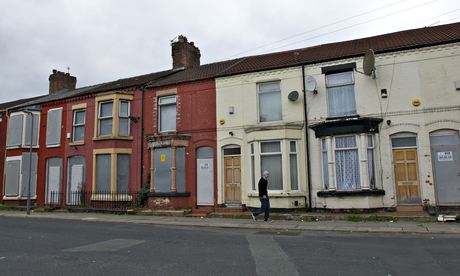 Parts of Liverpool and Gateshead have been demolished by the government, the old streets replaced with smaller numbers of new homes. The result? The uprooting of people who wanted to stay put and zones of demolished and empty buildings. Photograph: Nigel R. Barklie/REX
Parts of Liverpool and Gateshead have been demolished by the government, the old streets replaced with smaller numbers of new homes. The result? The uprooting of people who wanted to stay put and zones of demolished and empty buildings. Photograph: Nigel R. Barklie/REX
Parts of Liverpool or Gateshead, for example: places afflicted by the last government's Housing Market Renewal Pathfinder project, where about £2bn of public money was spent buying up streets in areas of low value, demolishing them, and replacing them with smaller numbers of new homes. The theory was that, under the laws of supply and demand, reduced supply would raise values. The reality was the breaking up ofcommunities, the uprooting of people who wanted to stay put and devastated zones of demolished and empty buildings.
Overcrowded London
Flats and backyards adapted to house as many people as possible.
Empty Belgravia
Extraordinarily expensive houses owned by people with properties in several other countries, such that they are usually unoccupied. Often also iceberg houses, with multifloor basements expensively created underneath, to create further quantities of void.
Nonexistent new town
Successive governments are lured to the attractive idea of the new town, as it enables large numbers of homes to be built while annoying fewer residents than if they have been spread over a wider area. It appeals to politicians' love of a visible gesture. The same governments then fail to provide the infrastructure and planning to make these towns happen. The last administration promised both a new city in the Thames Gateway, to the east of London, and a series of "ecotowns". Very little of either appeared.
It is not in fact so difficult to create good modern housing. There are well-known examples in continental Europe, often cited in discussions of the subject, such asHammarby Sjöstad in Stockholm, Vauban in Freiburg, and Borneo Sporenburg in Amsterdam. Peter Hall, the planning expert whose recent book, Good Cities, Better Lives, explores the best European examples, says that there is an "extraordinary similarity" between these schemes: they have good public transport, from which all homes are within easy walking distance, and "a good disposition of semi-public spaces", such as playgrounds and shared gardens.
 St Andrews in East London: housebuilder Barratt, not always a byword for design quality, is responsible for this project with its emphasis on robust detailing, balconies and shared space.
St Andrews in East London: housebuilder Barratt, not always a byword for design quality, is responsible for this project with its emphasis on robust detailing, balconies and shared space.
Nor is Britain incapable of decent developments. Barratt, a housebuilder not always associated with design quality, has built the St Andrews and Barrier Park projects in east London, albeit only after prodding from the London Development Agency, the public body that sold it the land. Richard Lavington, one of the architects of these developments, says that the aims were "to put a balcony on every unit, and to create a positive interface between private and public", by which he means placing family homes close to shared open spaces and streets in such a way that they might readily use them. He also sought "clear, robust detailing" that would be "straightforward to build".
Again, this is not complicated stuff and the developments live up to these claims. Cognoscenti of new housing will also know of fine, small-scale projects by the developers Crispin Kelly of Baylight and Roger Zogolovitch of Solidspace. Kelly says: "Big windows and high ceilings are a start, and lack of fussiness – having the confidence to do things simply." Inside, he likes bonus spaces – on a stair landing for example – where a child might do homework, and outside something as basic as a bench that encourages neighbours to meet. Like Kelly, Zogolovitch likes undesignated spots "where you might set up a cello or an easel or write a novel". He uses design to make small spaces feel larger and give them personality.
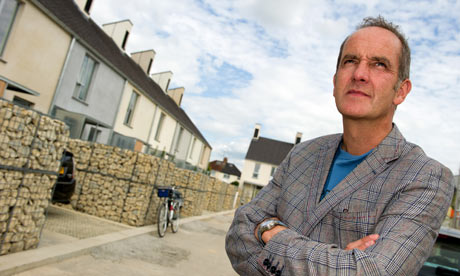 Kevin McCloud at The Triangle housing project in Swindon. Photograph: Professional Images
Kevin McCloud at The Triangle housing project in Swindon. Photograph: Professional Images
In Swindon there is The Triangle, created with the help of Kevin McCloud's company Hab, which also stresses the importance of shared space and simple design. And, when you ask for examples of good new housing, you keep being referred back to Cambridge. Here is Accordia, which won the Stirling prize in 2008, and the university-backed £1bn plan to create 3,000 homes, half of them for key workers, on 150 hectares in the north-west of the city. Also in Cambridge are developments such as the "Scandinavian-style"Seven Acres, by the multinational construction company Skanska, which again is based on the virtues of simplicity and shared space.
But these bright spots are too rare and require favourable conditions, such as having a TV personality or an ancient university to back them. They tend to be in places such as London or Cambridge, where prices rise faster than elsewhere. This helps to pay for more quality, but by definition makes it harder to achieve.
The housing crisis is one of both quantity and quality. Some 250,000 new homes a year are said to be needed, but after 2008 the number fell below 100,000, mostly built by private housebuilders but also by housing associations. In the postwar peak in the late 60s, more than 400,000 were created a year, many of them by the councils later banned from building by Margaret Thatcher. Meanwhile, the private sector built at a reasonably steady rate from the late 1950s on, between 150,000 and 250,000 a year. Until the 2008 crash, that is, when output plummeted to a level not seen for half a century.
Blame for this lack of supply is usually placed on the planning system. There is nowhere in southern England for new housing to go or, rather, nowhere where voters and therefore politicians want it to go. Suggestions of building anything on the green belt bring accusations of desecration of a national treasure and similarly with rural locations further from big cities. The theory that brownfields, that is ex-industrial sites, could answer all housing need has proved challenging in practice. Such sites are not always where people want to live.
Suggestions for fixing the problem include, as always, the new town or, as George Osborne likes to call it, the "garden city". He used the term when repackaging existing proposals for Ebbsfleet in Kent, and presenting them as his invention, but his duplicity should not obscure the possibility that it might be a good idea. Peter Hall passionately believes that the principal hope for housing is building new towns and town-size extensions to existing cities. The new towns created in the 1960s, of which Milton Keynes is the biggest and best known, may have become the butt of patronising jokes, but, says Hall, "were really rather successful". They did their job of relieving pressure and "all the evidence shows that people like living there".
Another idea is to fit more homes into London, which is several times less densely populated than, for example, Paris. Another is to encourage people to build their own houses, which currently accounts for a minute proportion of the total. Another, popular with the current government, is the "neighbourhood plan". Here, local communities (usually rural) put together their own proposals for development so that some of the proceeds go to shared benefits and growth is no longer an aggressive intervention by outsiders. It might also help if we moved away from the preoccupation of home ownership with the help of decent properties for private rent. Michael Heseltine once said that "there is in this country a deeply ingrained desire for home ownership", but in 1900 90% of homes, at almost every level of price, were rented.
All these suggestions have merit and the answer is almost certainly to embrace all of them and more. We have to go from our current culture, where new housing is treated as pollution, and something to be squeezed through the planning system with the greatest difficulty, to one where it is seen as a positive asset. There is a vicious circle – new development is poor because it takes so much effort to overcome objections and people object to it because it is poor.
But none of these ideas will happen without the thing the coalition has been least willing to employ, which is active and forward-looking public intervention. It is hard to build a new town, or a well considered rural expansion, without things such as compulsorily buying land, paying professionals to plan it or providing transport. As Dickon Robinson, formerly of housing association the Peabody Trust puts it: "The market has failed. It's time to put some controversial ideas out there."
The compulsory purchase by government from private landowners sounds communist, but it was used (for example) in the "renewal" of northern cities. It is just that politicians are more reluctant to wield it in Kent than in Gateshead. If we are sceptical about the power of planners to achieve their objectives, we only need to look at the Netherlands. There, they had a similar scale of housing shortage, in proportion to the country's size, to the one that has been diagnosed in Britain for the past 15 years. Unlike Britain, they fixed it, by building nearly half a million new homes.
Planning apart, there is a deep flaw with the idea that the market alone will meet all the country's housing needs. The problem is not only to do with the numbers supplied, but with how much each home costs and housebuilders cannot be expected to lead a process that results in the value of their product going down. They would rather sit on their land until such time as its price goes up, which means that some other agency has to do what they won't, which means, in effect, that the government has to intervene more actively in promoting building – by acquiring land, producing considered plans for its development, and then promoting such development.
Given that in much of Britain the price of homes is high, a slow deflation might be desirable; the ideal could be that prices stay the same, so that they gently fall in real terms. But the coalition's big idea is the opposite. With Help to Buy, changing pension rules and other measures, they have stimulated demand without a corresponding increase in supply, such that prices go up further. As the Financial Times has said, this is economically illiterate. It would be a useful first step to reverse these policies.
We are now at a moment similar to the 1970s, when ideas about housing that had lasted a generation stopped working. Then it was the legacy of Clement Attlee's postwar government, which believed in massive state provision of housing, but which ended up restricting freedoms and too often creating homes people didn't like. Thatcher's policies were a necessary corrective, and had real benefits, but now they too are failing. It is time for something new.
It's not easy to champion planning, as it tends to summon images of faceless bureaucrats and grandiose visions gone wrong. But, as Hermann Muthesius recognised in the early 1900s, and as Peter Hall argues about 1960s new towns, it is not un-British to plan and design new communities well. The national dependency on high house prices has, in its effects, become an economic, social and cultural disaster. Active intervention is needed. As someone once said, there is no alternative.
Thursday, 2 January 2014
Artificially prolonged old age is the new iatrogenic malady. - When it's time to go, let me go, with a nice glass of whisky and a pleasing pill
Advances in science are keeping us alive for longer and longer, but we are denied the right to die with dignity. It is grotesque
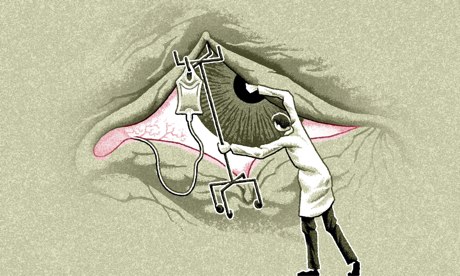
'Don't blame us if we are cluttering up the system. What we want and need is simple: a change in the law concerning assisted dying and voluntary euthanasia.' Illustration: Matt Kenyon
Back in the mid-70s, we were introduced to the notion of "medical nemesis" by the Austrian philosopher Ivan Illich. He warned us that doctors may do more harm than good, and that some diseases (which he labelled iatrogenic) were caused, not cured, by medical interventions. This doctrine has been widely accepted – we all know about the dangers of overprescribing antibiotics, about the risks of over-zealous or misinterpreted scans, about the creeping medicalisation of childbirth – but its application to old age and death is what interests me here. One of Illich's arguments in those days was that medicine, despite its apparent successes, was not notably increasing life expectancy. Alas, he was wrong. Artificially prolonged old age is the new iatrogenic malady.
We can't switch on the news without being told we will live longer, work longer, and survive on diminishing pensions or overpriced annuities. Newspaper columnists tell us we are selfish and that the young are suffering from our claiming an unfair share of state support. They begrudge us our bus passes, one of the few well-earned consolations of age. As we move into our unwanted last decade, we will, entirely predictably, become lonelier and lonelier and more and more likely to suffer from dementia and more and more expensive to maintain.
It would be unfair to blame doctors or health professionals for our longevity, which may be attributed to causes other than surgical ingenuity and pharmacological innovations and deadly life support machines, but it is not surprising that many of us feel gravely disappointed by the help and relief on offer to us at the end of life.
We look in vain for compassion, dignity, even common sense. We look in vain, despite what we are told, for adequate pain relief. Medical professionals seem far more interested in keeping alive barely viable premature "miracle" babies with a poor long-term prognosis than in offering reassurance to the growing and ageing multitudes who long to depart peacefully. They keep the babies alive because it's challenging, and very few people dare argue that it's not a good thing to do. They keep us alive because they are forbidden to give us what we want and need, and they are too frightened to question the law. There's something wrong there.
Don't blame us if we are cluttering up the system. What we want and need is simple. We want a change in the law concerning assisted dying and voluntary euthanasia, and help, if need be, to die with dignity.
The groundswell of opinion in favour of change is unmistakable. How often do you hear phrases like "you wouldn't let your dog suffer like that"? Three-quarters of the population backed Lord Falconer's assisted dying bill on its first reading in parliament. The bill would allow people who are terminally ill to receive the help they need to die, if that is what they choose. But can we have what we want? No. The politicians won't let us, the bishops won't let us, the health professionals aren't allowed to let us. It's grotesque.
Those suffering from incurable diseases need to be able to choose without penalty the help which they are at the moment denied. The elderly need to be able to plan ahead clearly, and to make their own choices about when their lives are no longer worth living. There seems to be some conspiracy to stop us thinking about the end game we all shall play. So we shuffle on, until it's too late to make any decisions at all, and we become helpless pawns in the politics of deferral, and utterly dependent on the humiliating procedures that for all our rational life we so wished to avoid.
It is my hope that in my lifetime the law will change, taking with it the fears that add so much terror to death. How wonderful it would be, if we knew that we would not be obliged to contemplate the bodily and mental decay that threatens us all. That we could opt out, and make our quietus, not with a bare bodkin or a plastic bag, or by jumping off the top of a multistorey car park, but with a nice glass of whisky and a pleasing pill – and so good night. How the heart would lift with joy at the good news. I don't go for Martin Amis's suicide booths, but I'm with Will Self all the way about the right to die when and how we want. When it's time to go, let's just go.
At the moment, it's not that easy. My husband, Michael Holroyd, fondly believes that as the longest serving patron of the Dignity in Dying campaigning organisation, he will be allowed to die in peace, but no, the doctors, in mortal fear of parliament, the law, the press and the General Medical Council, will be slavishly working to rule and obeying orders and striving officiously to keep him alive as they observe their archaic Hippocratic oath. It will be just like it was in the old days, when Simone de Beauvoir described her mother's death, in the ironically titled A Very Easy Death. If a woman of her intellect and clout couldn't prevent her mother from being hacked about by surgeons on her deathbed, what hope have we?
The best new year's gift an ageing population could receive is the right to die. As the philosopher Joseph Raz argues "The right to life protects people from the time and manner of their death being determined by others, and the right to euthanasia grants each person the power to choose themselves that time and manner." The right to die is the right to live.
Thursday, 5 April 2012
The Heathen Manifesto
Many religious citizens will be grateful to Baggini for marking out some promising shared ground, but the devil is in the detail
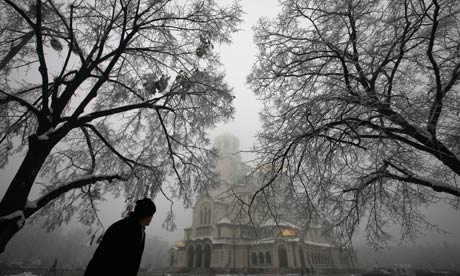
A man walks past the golden-domed Alexander Nevski cathedral in Sofia, Bulgaria. Photograph: Petar Petrov/AP
Living in a heathen state might not be as bad as religious believers had feared. If I've understood article eight of Julian Baggini's heathen manifesto correctly, many religious citizens should be able to affirm quite readily three features of the secular state that he summarises.
First, religion has a legitimate place in politics. Unlike those on the control-freak wing of secularism, Baggini has no desire to banish religious or other worldviews from public life or to stop their adherents invoking such beliefs in policy debates. So presumably it's fine, then, for Operation Noah's recent Ash Wednesday Declaration not only to cite the familiar grim statistics about climate change, but also to quote ancient Jewish sacred texts and lobby the government accordingly. By implication, it's equally legitimate for secular humanists seeking the legalisation of assisted suicide not just to confine themselves to the prosaic legal language of rights, but also to appeal to deeper and more expansive convictions such as that human dignity ultimately resides in the capacity for moral autonomy (a view represented in chapter 2 of the Falconer commission report).
Second, while democratic debate should thus not be arbitrarily hampered by restrictions on religious or other worldview-based ideas, the state "should not give any special privilege to any particular sect or group, or use their creeds as a basis for policy". Actually, the two parts of that claim are distinct. One is that the state should treat groups holding various worldviews even-handedly, for example by avoiding funding or granting access to one while arbitrarily excluding others. The other is that the state should refrain from officially invoking any worldview or creed in publicly justifying any of its policies. So state officials shouldn't quote the Bible as official justification for the 2008 Climate Change Act, and nor should they cite a humanist doctrine of the primacy of moral autonomy in support of a law allowing assisted suicide. In other words, while we citizens can appeal to such grounds, ministers and civil servants shouldn't, even if they personally endorse them.
Third, in democratic politics, people should "formulate and justify policy in terms that all understand, on the basis of principles that as many as possible can share". Christian philosopher Christopher Eberle calls this the "obligation to pursue public justification" and commends it as part of a wider "ideal of conscientious engagement". That is, citizens who respect each other as equals should do their best to appeal to public norms their fellow citizens can affirm or at least acknowledge as valid, and not just for the obvious pragmatic reason that they might actually be listened to.
Many religious citizens will thus be grateful to Baggini for marking out some promising shared ground. But when we try to specify the precise meaning of the second and third features of his secular state, we rapidly find ourselves in territory that is hotly contested both within and between religious and secular worldviews. "State neutrality" implies some notion of equal treatment. But while it plainly rules out the official "establishment" of a worldview – Christianity in the Roman empire, Islam in Iran, or atheistic communism in the USSR – it is far from obvious what else it implies. Does it exclude all and any state funding of faith-based schooling, as in the US, or does it require a pluralistic European model in which several religious and worldview-based schools are funded proportionately? Does it mandate equal recognition of all conceptions of "marriage" or only those honouring the equality of men and women (or men and men, and women and women)? Appealing to "neutrality" doesn't solve questions like these, but merely prods at a hornets' nest of vigorous disagreement. Neutrality itself is an empty concept that is parasitic upon a prior social ontology that takes a view on the nature of the entities among which the state is supposed to be neutral.
Specifying what "public justification" amounts to is no less demanding. After an exhaustive analysis of what the term might actually require of participants in democratic debate, Eberle concludes that both religious and secular citizens may, despite their best efforts, find themselves coming up with justifications that turn out to seem invalid by many members of the public. And this isn't a sign of epistemic failure, only of the inherent limits of rational communication in a morally fragmented culture. The problem isn't unintelligibility: any passably educated secular humanist can make sense of an appeal to an ancient Hebrew text, just as a reasonably well-informed Muslim can make sense of a Kantian conception of human dignity. The problem is incompatibility; the deep chasm separating one citizen's deepest worldview commitments from another's.
More troublingly, the requirement to justify one's policy commitments only in terms of supposedly "shared principles" can serve to entrench the discursive hegemony of whatever happens to be the current majority position – such as the stubbornly persistent yet irrational faith, shared by every party except the Greens, that endless growth of GDP is the only way out of recession and even the only route to address global warming. Marginalised minorities know all about the power of such hegemonic convictions when their dissenting demands run up against what a complacent majority takes as self-evidently true.
The high principle of article eight of the heathen manifesto has flagged up an important debate. Let's now take up the difficult work of analysing what it might actually mean on the ground.
-----
Atheists, please read my heathen manifesto
Atheists are too
often portrayed as bishop-bashing extremists and any meaningful debate
with the religious becomes impossible. How can this be remedied? At the
Guardian Open Weekend, Julian Baggini presented his 12 rules for
heathens
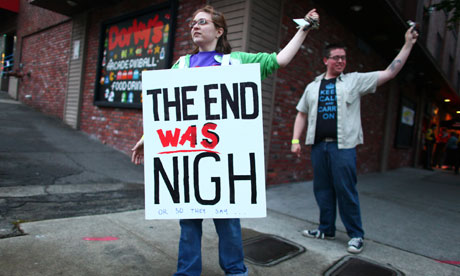
Atheists protest in Tacoma, Washington. Photograph: Joshua Trujillo
In recent years, we atheists have become more confident and outspoken in articulating and defending our godlessness in the public square. Much has been gained by this. There is now wider awareness of the reasonableness of a naturalist world view, and some of the unjustified deference to religion has been removed, exposing them to much needed critical scrutiny.
Unfortunately, however, in a culture that tends to focus on the widest distinctions, the most extreme positions and the most strident advocates, the "moderate middle" has been sidelined by this debate. There is a perception of unbridgeable polarisation, and a sense that the debates have sunk into a stale impasse, with the same tired old arguments being rehearsed time and again by protagonists who are getting more and more entrenched.
It is time, therefore, for those of us who are tired of the status quo to try to shift the focus of our public discussions of atheism into areas where more progress and genuine dialogue is possible. To achieve this, we need to rethink what atheism stands for and how to present it. The so-called "new atheism" may have put us on the map, but in the public imagination it amounts to little more than a caricature of Richard Dawkins, which is not an accurate representation of the terrain many of us occupy. We now need something else.
This manifesto is an attempt to point towards the next phase of atheism's involvement in public discourse. It is not a list of doctrines that people are asked to sign up to but a set of suggestions to provide a focus for debate and discussion. Nor is it an attempt to accurately describe what all atheists have in common. Rather it is an attempt to prescribe what the best form of atheism should be like.
1 Why we are heathens
It has long been recognised that the term "atheist" has unhelpful connotations. It has too many dark associations and also defines itself negatively, against what it opposes, not what it stands for. "Humanist" is one alternative, but humanists are a subset of atheists who have a formal organisation and set of beliefs many atheists do not share. Whatever the intentions of those who adopt the labels, "rationalist" and "bright" both suffer from sounding too self-satisfied, too confident, implying that others are irrationalists or dim.If we want an alternative, we should look to other groups who have reclaimed mocking nicknames, such as gays, Methodists and Quakers. We need a name that shows that we do not think too highly of ourselves. This is no trivial point: atheism faces the human condition with honesty, and that requires acknowledging our absurdity, weakness and stupidity, not just our capacity for creativity, intelligence, love and compassion. "Heathen" fulfils this ambition. We are heathens because we have not been saved by God and because in the absence of divine revelation, we are in so many ways deeply unenlightened. The main difference between us and the religious is that we know this to be true of all of us, but they believe it is not true of them.
2 Heathens are naturalists
Heathens are not merely unbelievers: we believe many things too. Most importantly, we believe in naturalism: the natural world is all there is and there is no purposive, conscious agency that created or guides it. This natural world may contain many mysteries and even unseen dimensions, but we have no reason to believe that they are anything like the heavens, spirit worlds and deities that have characterised supernatural religious beliefs over history. Many religious believers deny the "supernatural" label, but unless they are willing to disavow such beliefs as in the reality of a divine person, miracles, resurrections or life after death, they are not naturalists.3 Our first commitment is to the truth
Although we believe many things about what does and does not exist, these are the conclusions we come to, not the basis of our worldview. That basis is a commitment to see the world as truthfully as we can, using our rational faculties as best we can, based on the best evidence we have. That is where our primary commitment lies, not the conclusions we reach. Hence we are prepared to accept the possibility that we are wrong. It also means that we respect and have much in common with people who come to very different conclusions but have an equal respect for truth, reason and evidence. A heathen has more in common with a sincere, rational, religious truth-seeker than an atheist whose lack of belief is unquestioned, or has become unquestionable.4 We respect science, not scientism
Heathens place science in high regard, being the most successful means humans have devised to come to a true understanding of the real nature of the world on the basis of reason and evidence. If a belief conflicts with science, then no matter how much we cherish it, science should prevail. That is why the religious beliefs we most oppose are those that defy scientific knowledge, such as young earth creationism.Nonetheless, this does not make us scientistic. Scientism is the belief that science provides the only means of gaining true knowledge of the world, and that everything has to be understood through the lens of science or not at all. There are scientistic atheists but heathens are not among them. Science is limited in what it can contribute to our understanding of who we are and how we should live because many of the most important facts of human life only emerge at a level of description on which science remains silent. History, for example, may ultimately depend on nothing more than the movements of atoms, but you cannot understand the battle of Hastings by examining interactions of fermions and bosons. Love may depend on nothing more than the physical firing of neurons, but anyone who tries to understand it solely in those terms just does not know what love means.
Science may also make life uncomfortable for us. For example, it may undermine certain beliefs about free will that many atheists have relied on to give dignity and autonomy to our species.
Heathens are therefore properly respectful of science but also mindful of its limits. Science is not our Bible: the last word on everything.
5 We value reason as precious but fragile
Heathens have a commitment to reason that fully acknowledges the limits of reason. Reason is itself a multi-faceted thing that cannot be reduced to pure logic. We use reason whenever we try to form true beliefs on the basis of the clearest thinking, using the best evidence. But reason almost always leaves us short of certain knowledge and very often leaves us with a need to make a judgment in order to come to a conclusion. We also need to accept that human beings are very imperfect users of reason, susceptible to biases, distortions and prejudices that lead even the most intelligent astray. In short, if we understand what reason is and how it works, we have very good reason to doubt those who claim rationality solely for those who accept their worldview and who deny the rationality of those who disagree.6 We are convinced, not dogmatic
The heathen's modesty about the power of reason and the certainty of her conclusions should not be mistaken for a shoulder-shrugging agnosticism. We have a very high degree of confidence in the truth of our naturalistic worldview. But we do not dogmatically assert it. Being open to being wrong and to changing our minds does not mean we lack conviction that we are right. Strength of belief is not the same as rigidity of dogma.7 We have no illusions about life as a heathen
Many people do not understand that it is possible to lead a meaningful, happy life as a heathen, but we maintain that it is and can point to any number of atheist philosophers and thinkers who have explained why this is so. But such meaning and contentment does not inevitably follow from becoming a heathen. Ours is a universe without guarantees of redemption or salvation and sometimes people have terrible lives or do terrible things and thrive. On such occasions, we have no consolation. That is the dark side of accepting the truth, and we are prepared to acknowledge it. We are heathens because we value living in the truth. But that does not mean that we pretend that always makes life easy or us happy. If the evidence were to show that religious people are happier and healthier than us, we would not see that as any reason to give up our convictions.8 We are secularists
We support a state that is neutral as regards people's fundamental worldviews. It is not neutral when it comes to the shared values necessary for people of different conviction to live and thrive together. But it should not give any special privilege to any particular sect or group, or use their creeds as a basis for policy. Politics requires a coming together of people of different fundamental convictions to formulate and justify policy in terms that all understand, on the basis of principles that as many as possible can share.This secularism does not require that religion is banished from public life or that people may not be open as to how their faiths, or lack of one, motivate their values. As long as the core of the business of state is neutral as regards to comprehensive worldviews, we can be relaxed about expressions of these commitments in society at large. We want to maintain the state's neutrality on fundamental worldviews, not purge religion from society.
9 Heathens can be religious
There are a small minority of forms of religion that are entirely compatible with the heathen position. These are forms of religion that reject the real existence of supernatural entities and divinely authored texts, accept that science trumps dogma, and who see the essential core of religion in its values and practices. We have very little evidence that anything more than a small fraction of actual existent religion is like this, but when it does conform to this description, heathens have no reason to dismiss it as false.10 Religion is often our friend
We believe in not being tone-deaf to religion and to understand it in the most charitable way possible. So we support religions when they work to promote values we share, including those of social justice and compassion. We are respectful and sympathetic to the religious when they arrive at their different conclusions on the basis of the same commitment to sincere, rational, undogmatic inquiry as us, without in any way denying that we believe them to be false and misguided. We are also sympathetic to religion when its effects are more benign than malign. We appreciate that commitment to truth is but one value and that a commitment to compassion and kindness to others is also of supreme importance. We are not prepared to insist that it is indubitably better to live guided by such values allied with false beliefs than it is to live without such values but also without false belief.11 We are critical of religion when necessary
Our willingness to accept what is good in religion is balanced by an equally honest commitment to be critical of it when necessary. We object when religion invokes mystery to avoid difficult questions or to obfuscate when clarity is needed. We do not like the way in which "people of faith" tend to huddle together in an unprincipled coalition of self-interest, even when that means liberals getting into bed with homophobes and misogynists. We think it is disingenuous for religious people to talk about the reasonableness of their beliefs and the importance of values and practice, while drawing a veil over their embrace of superstitious beliefs. In these and other areas, we assert the right and need to make civil but acute criticisms.And although our general stance is not one of hostility towards religion, there are some occasions when this is exactly what is called for. When religions promote prejudice, division or discrimination, suppress truth or stand in the way of medical or social progress, a hostile response is an appropriate, principled one, just as it is when atheists are guilty of the same crimes.
12 This manifesto is less concerned with distinguishing heathens from others than forging links between us and others
Our commitment to independent thought and the provisionality of belief means that few heathens are likely to agree completely with this manifesto. It is therefore almost a precondition of supporting it that you do not entirely support it. At the same time, although very few people of faith can be heathens, many will find themselves in agreement with much of what heathens belief. This is what provides the common ground to make fruitful dialogue possible: we need to accept what we share in order to accept with civility and understanding what we most certainly do not. This is what the heathen manifesto is really about.
Subscribe to:
Comments (Atom)



